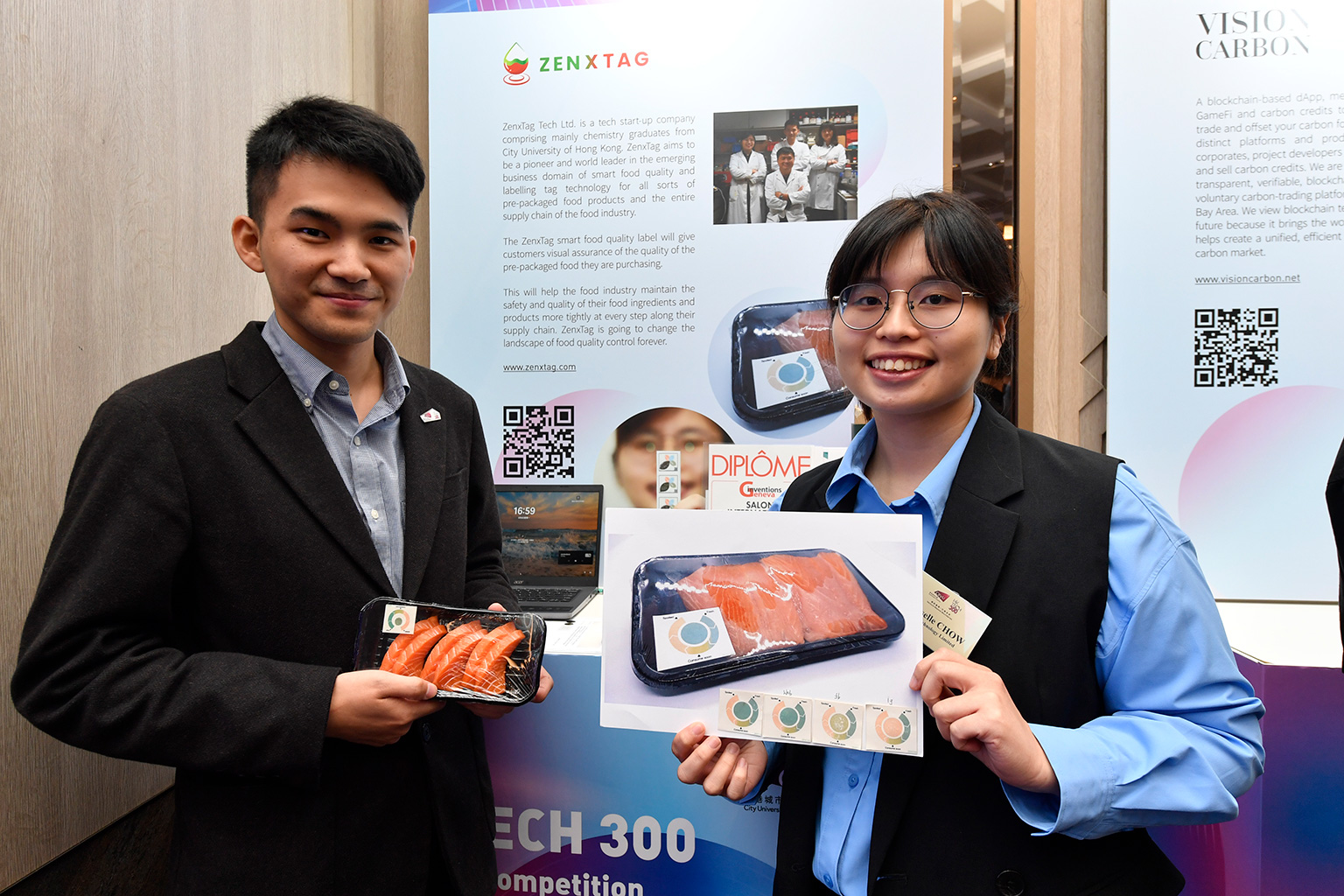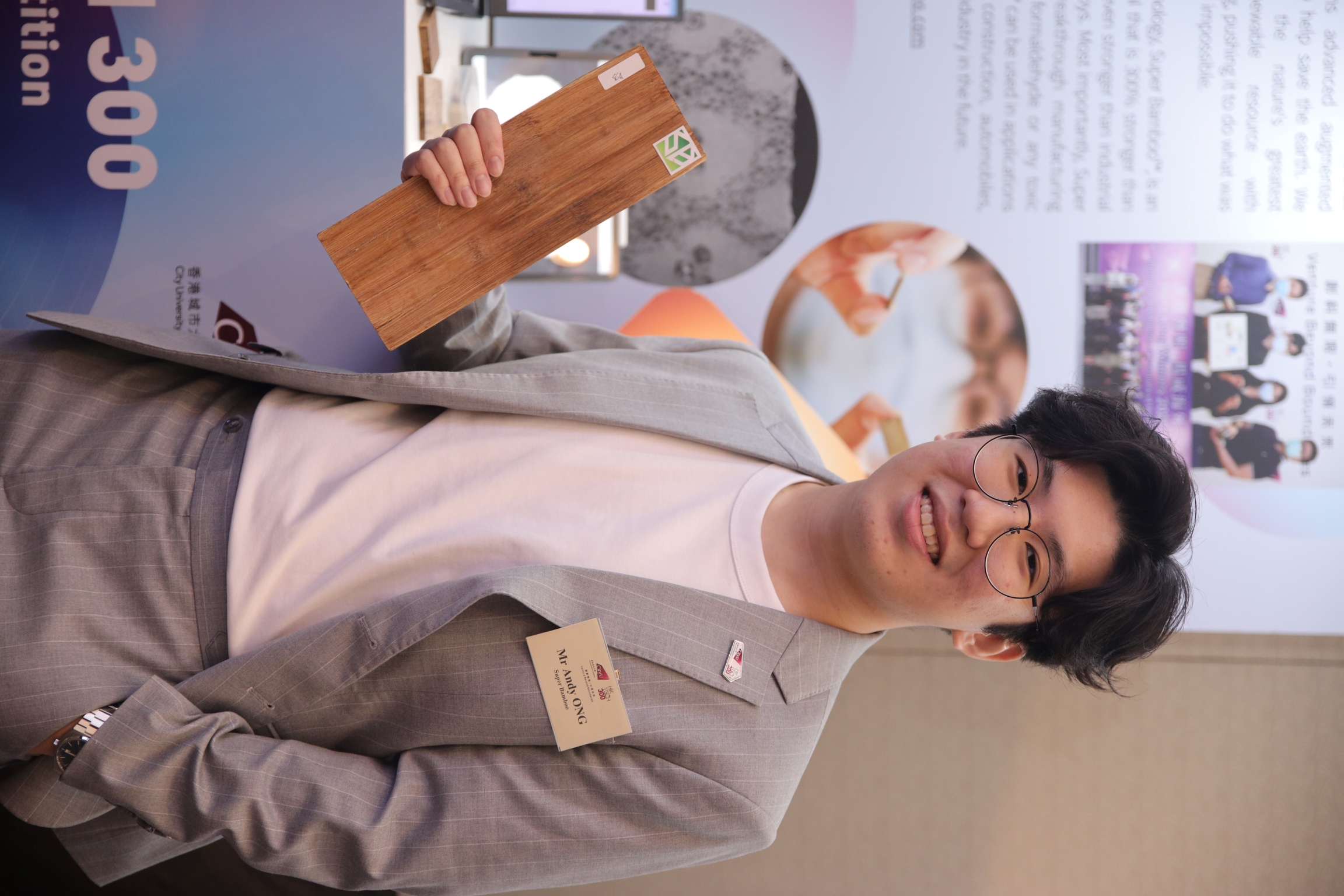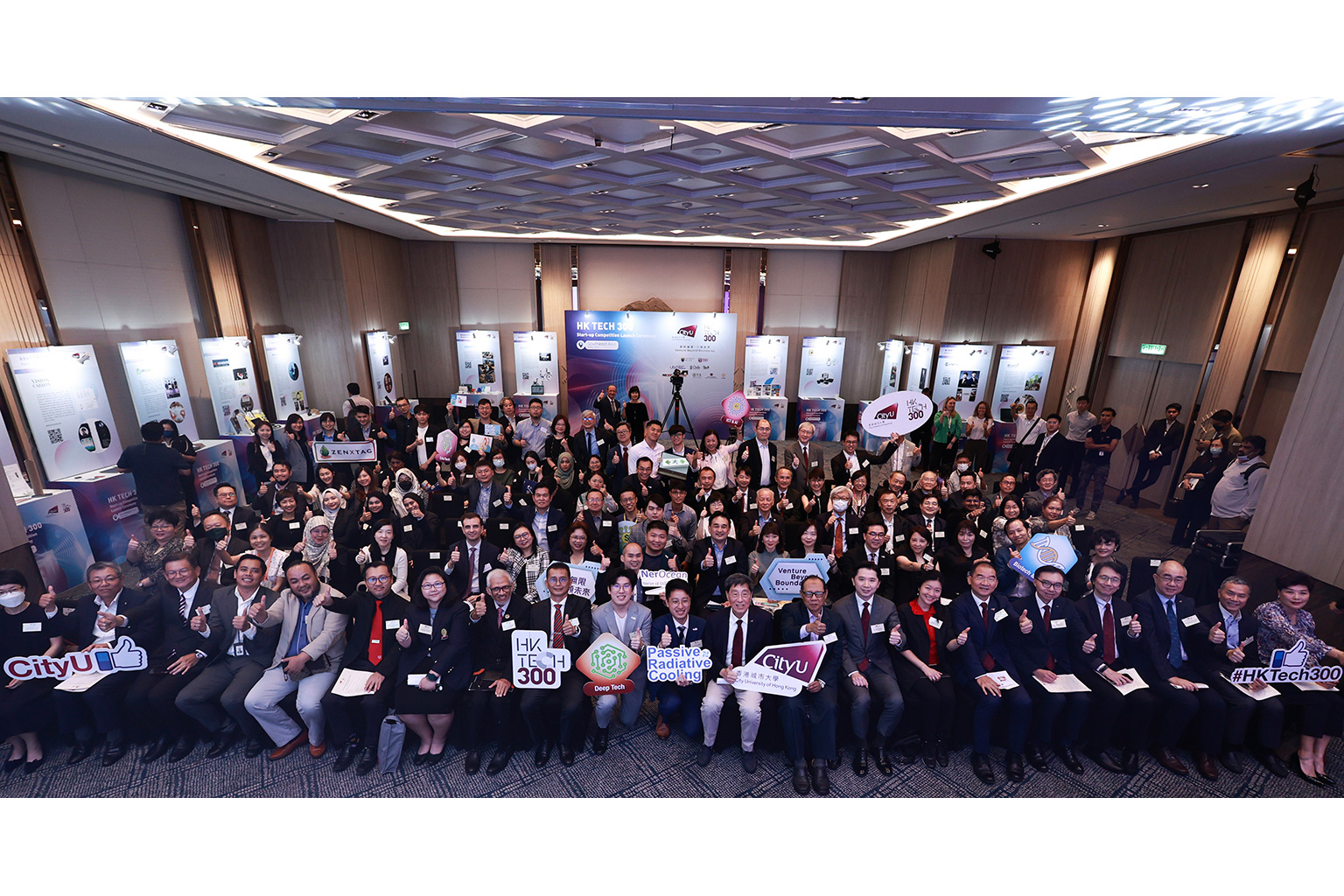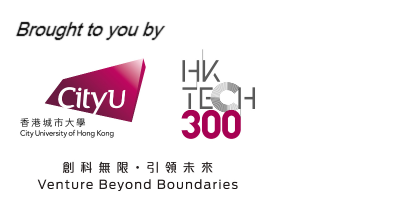BRANDED CONTENT
Smart label tells if your meat has gone bad: How start-up scores funding to fight food waste with technology
With support from City University of Hong Kong’s HK Tech 300 programme, companies like ZenxTag have created high-tech, environmentally friendly solutions for the food, construction and aerospace industries

Mr Zhou Chuanwen (left) and Ms Giselle Chow are the consultant and director of ZenxTag respectively, a company behind a paper-based smart food label that detects the freshness of protein-rich items. PHOTO: CITY UNIVERSITY OF HONG KONG
Wondering if the chicken in your fridge that is just past its best-before date can still be eaten? In the near future, an innovative smart food label could tell you whether you need to dispose of the item or if you can safely consume it.
This clever label was conceived by start-up ZenxTag, made up of a team of researchers from City University of Hong Kong (CityU). The paper-based smart food label contains CityU-patented chemosensitive ink that reacts with biogenic amine, a well-known biomarker for detecting freshness in protein-rich items such as meat and seafood.
A small hole is made in the wrap of pre-packaged food and the label is placed on top of this hole. When the food degrades and generates biogenic amine gas, it will react with the chemosensing agent and cause it to change colour from green to orange, indicating that the food has spoiled.
Ensuring food safety and curbing wastage
ZenxTag is one of the many start-ups incubated by HK Tech 300, CityU’s large-scale flagship innovation and entrepreneurship programme. HK Tech 300 aims to encourage aspiring entrepreneurs to launch start-ups by providing training, networking, seed funding and angel fund investment, as well as opportunities for further financial support.
It was also launched to translate CityU’s research achievements and intellectual property into practical applications to benefit society, and the university is keen to create 300 start-ups within three years.
Although detecting biogenic amine to gauge food freshness may not be anything new, ZenxTag’s invention stands out for its novel chemosensing technology.
“Other start-ups have developed similar products, but these use acid-based reactions for detection. These technologies can be affected by numerous factors, such as meat products prepared with acid additives or other chemicals, which can affect the pH value of the pre-packaged food,” says Ms Giselle Chow, director of ZenxTag and an alumna of CityU.
While ZenxTag initially manufactured the smart food label in the form of a hydrogel, the team later pivoted to a more environmentally friendly paper-based design. The researchers hope this can help make a dent in addressing the pressing global problem of food waste by offering a more precise and accurate assessment of food freshness than best-before dates, which are generally used as guidelines.
“It can inform customers whether the food is spoiled, potentially extending or replacing the expiration date. This could also significantly reduce food waste and improve food-shortage issues, while decreasing environmental pollution,” says Ms Chow.
Super-strength, eco-friendly bamboo
Another start-up nurtured through HK Tech 300 is Super Bamboo, a green materials company on a mission to save the planet. Their signature invention is an advanced augmented bamboo material that is three times tougher than regular bamboo and even stronger than industrial steel and titanium alloys.
“Our CityU-patented technology is a breakthrough manufacturing process. We believe that it is the first in the world to use zero glue, which is typically used to turn raw bamboo that is round in shape into engineered bamboo that is rectangular and more usable,” says Mr Andy Ong, CEO of Super Bamboo and an alumnus of CityU. “This introduces problems including additional embodied carbon, the emission of toxic formaldehyde and difficulty with recycling and biodegradation.”

While the company has yet to debut its product commercially, its far-reaching applications range from construction to the aerospace industry. “Existing satellites are made out of aluminium that, when burned up, could damage the ozone layer and release toxic substances,” says Mr Ong. “Super Bamboo can be a greener, healthier and cheaper alternative to make micro-satellites.”
Empowering early stage start-ups
Receiving support from CityU through HK Tech 300 was crucial for ZenxTag and Super Bamboo to get their inventions off the ground. Since its launch in 2021, the programme has amassed a total allocation of HK$600 million (S$103.6 million), equipping over 560 start-ups in diverse fields including artificial intelligence, biotech, health technology and fintech with a seed fund of HK$100,000 each. It has further awarded more than 110 start-ups with angel fund investment of up to HK$1 million each.
Not content with merely backing Hong Kong- and Mainland China-based start-ups, the programme is now going global. CityU recently hosted a ceremony in Kuala Lumpur, Malaysia, to kick-off its expansion into South-east Asia.

Through collaborations with partnering universities and incubators, start-ups that harness CityU-patented technology are eligible to enter the inaugural HK Tech 300 Southeast Asia Start-Up Competition. Teams will be chosen to compete in the final round, and the top 10 start-ups will each receive up to HK$1 million in angel fund investment.
Partners include the Malaysia Digital Economy Corporation, Selangor Information Technology and Digital Economy Corporation, Universiti Malaya and Universiti Putra Malaysia in Malaysia, Brunei’s Universiti Brunei Darussalam, Thailand’s Chulalongkorn University as well as various chambers of commerce. CityU is exploring additional collaborations across various sectors and countries – including Singapore – to allow even more start-ups to participate.
HK Tech 300’s expansion into South-east Asia is part of CityU’s mission to promote technology transfer and commercialisation in the South-east Asian region and assist start-ups in expanding their businesses to Hong Kong, Mainland China and beyond.
Both ZenxTag and Super Bamboo intend to leverage the programme to take their solutions to South-east Asia. ZenxTag wants to eventually deploy its smart food labels throughout the region’s retail markets, while Super Bamboo hopes to see its technology used in buildings and designs across South-east Asia.
Ms Chow says: “Our early-stage experiments were finished six years ago, but the development of our smart food label was stopped due to a lack of financial support. However, we managed to reboot the project with the encouragement and funding support from the HK Tech 300 programme.”
“There are not a lot of programmes that are willing to take a risk on early-stage start-ups by giving them such a big and flexible angel-stage investment,” says Mr Ong. “The HK Tech 300 programme is run by incredibly committed people who are supportive, well-connected and knowledgeable about the nitty gritty of start-ups – which is a game changer.”



